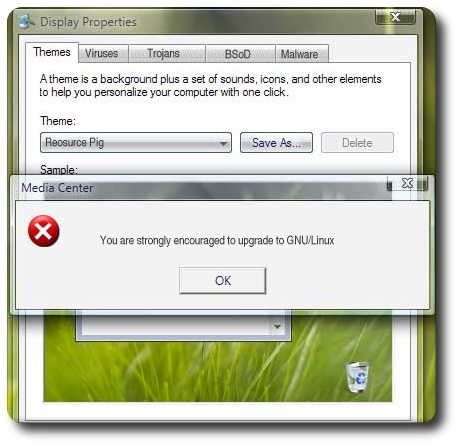Monday, October 2nd, 2006, 11:22 am
Software Oligopoly and Impending Transition

 shall continue to argue that Microsoft software (and Windows primarily) is slow and too cumbersome to work with. It discourages high productivity levels. Might this explain why that company from Redmond has produced so little in the past 5 years? Let us discuss.
shall continue to argue that Microsoft software (and Windows primarily) is slow and too cumbersome to work with. It discourages high productivity levels. Might this explain why that company from Redmond has produced so little in the past 5 years? Let us discuss.
I am shocked to see a software behemoth with so many employees still struggling to ship products on time. I can recall that rusty O/S called Windows XP, which was released when I was a teenager. It’s amazing that Microsoft has achieved so little in the past half a decade. All it has been able to get is just another ‘Service Pack’, to be ready some time next year. This one has a different name and a new theme, Aero Glass (see above). It also bears a hefty price tag.
Linux users may like to handle complexity, but meanwhile it seems as though their codebase is far more maintainable than that of Microsoft. In case you have not followed some key events, 60% of the codebase of Windows must be rewritten as it’s an utter pain to extend.
Let us take a step further and discuss the issues of security, diversity, and competition. Windows was not built with security or multiple users (network thereof) in mind, so it is merely ‘patched’ to bridge that crucial gap. A one-man election might work with Windows-based Diebold machine. Windows is, after all, a single-user O/S with some ‘hacks’ that make it possible to be used by multiple users in a network that involves more than a single user (e.g. Internet). And it’s worrisome. This has led to cyberstorms and makes the Internet a less pleasant place than ever before. Patches take long to issue because, in a codebase with ‘hacks’, there are just too many dependencies to consider. There is poor modularity. This monolithic approach leads to flakiness and unpredictable behaviours.
Is diversity the answer? Is a staged migration to more mature and reliable platforms the path to secure computing? I have little or no doubt about it. But this will not be easy. It is only natural to assert that Microsoft is doing illegal stuff to stifle its competition. Such a software industry vermin deliberately restricts ‘diversification’. There’s no parity in the industry that outmuscles any competitive threat before it matures to match the behemoth. It strives towards a state of mono/oligopoly and the law offers no barriers as it’s being tweaked by lobbyists.
Competition, you argue? I see none, but luckily people begin to see this and respond accordingly. It’s a false sense of competition when a startup needs and depends on vendor X in order to develop a product to compete with vendor X. That’s what Microsoft does through operating systems, distribution channels, licensing, and programming languages. A stronghold on the market may soon be broken, at least in Europe. The remainder of the world is secretly/quietly migrating to Linux, albeit the scale of this is not being blown out of proportion using advertisements. There is no marketing department in a Free software initiative.






 Filed under:
Filed under: 